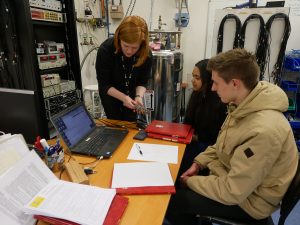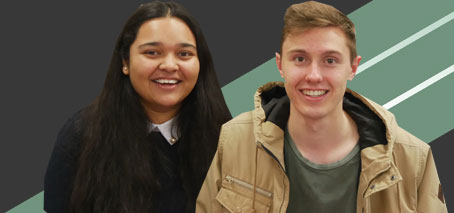
FLEET’s Karina Hudson assists Taste of Research students Seamus Lilley and Krittika Kumar in the lab
UNSW’s Taste of Research program provides undergraduate Physics students the opportunity to undertake a small research project with one of the research groups in the School.
Cecilia Bloise asked students Seamus Lilley and Krittika Kumar who worked with FLEET PhD Yonatan Ashlea Alava, to describe the experience for our research blog…
 What are you working on Seamus? “I worked with Yonatan to characterise and optimise the process of anodic oxidation in manufacturing quantum devices. This alternative process to etching allows for the definition of gates on devices.”
What are you working on Seamus? “I worked with Yonatan to characterise and optimise the process of anodic oxidation in manufacturing quantum devices. This alternative process to etching allows for the definition of gates on devices.”
 What is the “bigger picture”/end result of this research? “Using the information gathered by the characterisation, it will allow for the oxidation process to be applied to more complex devices; such as artificial graphene.”
What is the “bigger picture”/end result of this research? “Using the information gathered by the characterisation, it will allow for the oxidation process to be applied to more complex devices; such as artificial graphene.”
 What have you learned about research (ideally, generally, not specifically)? “I have developed a better sense of what research is. In setting out to achieve some goal, there will always be new and unanticipated challenges which will often require significant consideration as to how they can be overcome. Through the constant refining of your approach to accommodate the unexpected outcomes, you will gain a greater understanding of the processes involved in achieving your goal.”
What have you learned about research (ideally, generally, not specifically)? “I have developed a better sense of what research is. In setting out to achieve some goal, there will always be new and unanticipated challenges which will often require significant consideration as to how they can be overcome. Through the constant refining of your approach to accommodate the unexpected outcomes, you will gain a greater understanding of the processes involved in achieving your goal.”
“Research is a continual learning experience that often requires you to develop several approaches to a given problem, and through trial and error, you will arrive at the best method. It is also clear that research is rather collaborative, which enables you to draw upon the experiences of others who can offer a fresh perspective on a problem.”
 What has been the best/most fun/most surprising thing so far? “I have really enjoyed my time during Taste of Research – being able to shadow a PhD student has been a unique experience; one that I am very grateful for. Some of the notable highlights have been working with liquid helium to conduct some tests at 4K as well as observing in the University’s cleanroom facilities.”
What has been the best/most fun/most surprising thing so far? “I have really enjoyed my time during Taste of Research – being able to shadow a PhD student has been a unique experience; one that I am very grateful for. Some of the notable highlights have been working with liquid helium to conduct some tests at 4K as well as observing in the University’s cleanroom facilities.”
“Also, being able to work with such kind and supportive people have made this experience all the more enjoyable!”
 What are you working on Krittika? “Over the past term we have been working on making longer /variable length Quantum Point contacts.”
What are you working on Krittika? “Over the past term we have been working on making longer /variable length Quantum Point contacts.”
What is the bigger picture/end result of this research? “We’re hoping this research will be able to provide us more insight into a phenomenon known as “spin gap” as understanding this phenomenon could lead to important advances in quantum computing.”
 What have you learned about research? “It’s interesting exactly how specialised a project can become.”
What have you learned about research? “It’s interesting exactly how specialised a project can become.”
What has been the best/most surprising thing so far? “The best thing about doing this program has been being able to pick the brains of the academics in the group about interesting concepts in physics.”
FLEET/UNSW offered Taste of Research project opportunities in experimental condensed matter physics, studying the electronic properties of advanced quantum devices and topological materials, including:
- making and measuring atomically thin transistors using graphene and the “sticky tape” fabrication approach
- measuring the quantum Hall effect in two-dimensional systems
- studying quantum transport of holes in one-dimensional nanowires
- measuring single hole transport in quantum dots.
These projects were hands-on, with students working with FLEET researchers to perform experiments themselves, taking their own data, and in some cases handling liquid cryogens and helium refrigerators.

